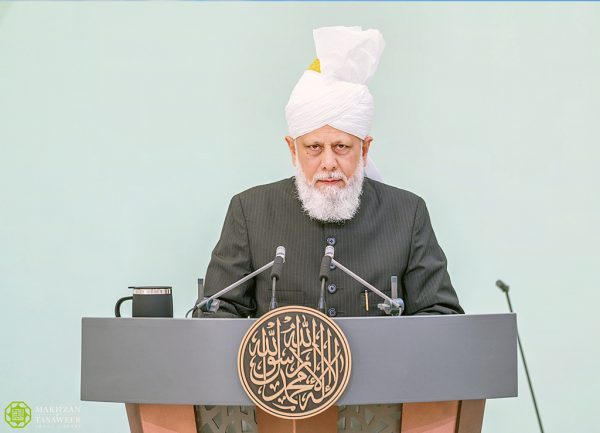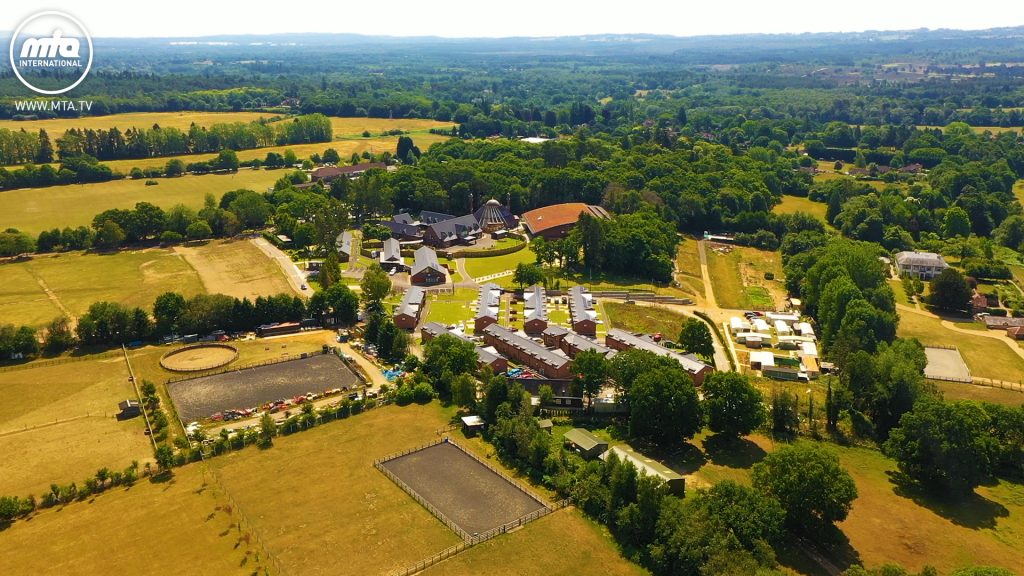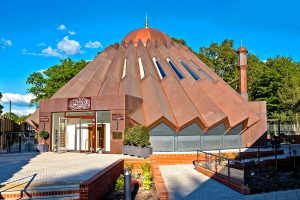After reciting Tashahhud, Ta‘awwuz and Surah al-Fatihah, His Holiness, Hazrat Mirza Masroor Ahmad (aba) said:
Prior to Ramadan, I was previously discussing the various expeditions of the Holy Prophet (sa). Today I shall continue the mention of this.

His Holiness (aba) said that the mother of Hazrat Sa’d bin Mu’adh (ra) went to the Holy Prophet (sa) whilst he was sitting on his horse. The Holy Prophet (sa) stopped for her and informed her of the martyrdom of her son Hazrat Amr bin Mu’adh (ra). In response, she said that seeing the Holy Prophet (sa) safe and well, all her worries were alleviated. The Holy Prophet (sa) gave her the glad tidings that all the martyrs of Uhud were together in Paradise and had interceded for their families. He instructed her to convey this to all the homes of the martyrs. The Holy Prophet (sa) then prayed for all the martyrs and their families.
His Holiness (aba) said that Hazrat Musleh Maud (ra) was addressing Ahmadi women and stated that these were the female companions at the time of the Holy Prophet (sa) who were at the forefront alongside the male companions in spreading the message of Islam. The Islamic world is proud of the sacrifices they made, and as it is your claim to believe in the Promised Messiah (as), you are a reflection of the female companions of the Holy Prophet (sa). He said that they must however analyse if they possess the same passion, zeal and light as them. Their sacrifices were so dear to God Almighty that what they achieved within a few years was unattainable for centuries by many other nations.
His Holiness (aba) said that he has mentioned certain incidents before, but at times, when reading them from another angle brings about a special zeal and fervour in a person. Hence, His Holiness (aba) quoted Hazrat Musleh Maud (ra) whilst discussing incidents of the female companions at the time of the Holy Prophet (sa). He stated that when the women of Madinah heard the news of the demise of the Holy Prophet (sa), they rushed to the battlefield of Uhud. Most of them were reassured on the way that he was alive and well, but one woman – whose husband, brother and father were all martyred – continued to rush ahead. She enquired about the Holy Prophet (sa) as soon as she arrived. After being told about the martyrdom of her family members, she only wanted to hear about the Holy Prophet (sa). Being told that he was alive, she rushed to him and said, ‘If you are alive and well, nothing else matters to me.’ Observe how much love she had for the Holy Prophet (sa) that her husband, father and brother had all been martyred, but her only response was to find out about the Holy Prophet (sa).
Rumour of Prophet’s Death Reaches Medina
His Holiness (aba) quoted Hazrat Musleh Maud (ra) who wrote in relation to the bravery shown by the people of Madinah:
‘The rumour of the Prophet’s (sa) death and the news of the dispersal of the Muslim army reached Medina, before the remnants of the Muslim force could return to the town. Women and children ran madly towards Uhud. Many of them learnt the truth from the returning soldiers and went back. One woman of the tribe of Banu Dinar went on until she reached Uhud. This woman had lost her husband, father and brother in the battle. According to some narrators, she had also lost a son. A returning soldier met her and told her that her father had died. She said in reply, “I do not care for my father; tell me about the Prophet (sa).” The soldier knew the Prophet (sa) was alive, so he did not answer her query at once, but went on to tell her of her brother and husband who had also died. At each report she remained unmoved and asked again and again, “What has the Prophet (sa) of God done?” It was a strange expression to use, but when we remember it was a woman who used it, it no longer seems so strange. A woman’s emotions are strong. She often addresses a dead person as though he were alive. If that person is nearly related, she tends to make a complaint to him and ask why he is abandoning her and leaving her behind uncared for and unlooked after. It is common for women to mourn the loss of their dear ones in this way. The expression used by this woman, therefore, is appropriate to a woman grieving over the Prophet’s (sa) death. This woman held the Prophet (sa) dear and refused to believe he was dead even after she had heard that he was. At the same time she did not deny the news but continued to say in true womanly grief, “What has the Prophet (sa) of God done?” By saying this she pretended the Prophet (sa) was alive, and complained that a loyal leader like him had chosen to give them all the pain of separation. When the returning soldier found that this woman did not care about the death of her father, brother and husband, he understood the depth of her love for the Prophet (sa) and told her, “As for the Prophet (sa), he is as you wish, fully alive.” The woman asked the soldier to show her the Prophet (sa). He pointed to one part of the field. The woman rushed to that part and reaching the Prophet (sa), held his mantle in her hand, kissed it and said, “My father and mother be sacrificed to thee, O Prophet (sa) of God, if thou livest, I care not who else dies.” We can see, therefore, what fortitude and devotion did Muslims – both men and women – display in this battle.
Christian writers narrate proudly the story of Mary Magdalene and her companions and tell us of their devotion and bravery. It is said that in the small hours of the morning, they stole through the Jews and made for the tomb of Jesus (as). But what is this compared with the devotion of this Muslim woman of the tribe of Dinar? One more example is recorded in history. After the dead had been buried and the Prophet (sa) was returning to Medina, he saw women and children who had come out of Medina to receive him. The cord of his dromedary was held by Sa‘d bin Mu‘adh, a chief of Medina. Hazrat Sa‘d (ra) was leading the dromedary pompously. He seemed to proclaim to the world that Muslims had after all succeeded in leading the Prophet (sa) back to Medina hale and hearty. As he was advancing he saw his own aged mother advancing to meet the returning party of Muslims. This aged woman was very weak-sighted. Hazrat Sa‘d (ra) recognised her and, turning to the Prophet (sa), said, “Here, O Prophet (sa), is my mother.” “Let her come forward,’ replied the Prophet (sa). The woman came forward and with a vacant look tried to spot the Prophet’s (sa) face. At last, she was able to spot it and was glad. The Prophet seeing her said, “Woman, I grieve over the loss of thy son” “But,” replied the devoted woman, “After I have seen you alive, I have swallowed all my misfortunes.” The Arabic expression she used was “I have roasted my misfortune and swallowed it.” What depth of emotion does this expression indicate? Normally, grief eats up a human being, and here was an aged woman who had lost her son, a staff for her old age. But she said that, instead of letting her grief eat her up, she had eaten up her grief. The fact that her son had died for the Prophet (sa) would sustain her during the rest of her days.’
(Introduction to the Study of the Holy Qur’an, pp. 145-146)
Funeral of the Martyrs of Uhud
Describing the love of the Holy Prophet (sa) for the martyrs of Uhud, Hazrat Mirza Bashir Ahmad (ra) writes:
‘Although a funeral prayer was not offered at the time, afterwards, close to the era of his demise, the Holy Prophet (sa) especially offered a funeral prayer for the martyrs of Uhud, and prayed for them with great anguish. The Holy Prophet (sa) would remember the martyrs of Uhud with special love and respect.
On one occasion, when the Holy Prophet (sa) passed by the graves of the martyrs of Uhud, he said, “These are such people whose faith I am a witness to.” Hazrat Abu Bakr (ra) submitted, “O Messenger of Allah! Are we not their brothers? Have we not also accepted Islam as they did? Have we not also partaken in Jihad for the sake of Allah as they did?” The Holy Prophet (sa) said, “Indeed! But how do I know of what you shall do after my demise?” Upon this Hazrat Abu Bakr (ra) began to weep, and continued to weep profusely. Then he said, “O Messenger of Allah! Shall we be able to live after your demise?”
The companions also held the martyrs of Uhud in high esteem, and always kept the memory of Uhud alive in their hearts as a sacred event. As such, on one occasion after the demise of the Holy Prophet (sa), Hazrat Abdur Rahman bin Auf (ra) was presented with some food to break his fast, which was perhaps somewhat elaborately prepared.
At this, he was reminded of the time of Uhud, when the Muslims did not even possess enough cloth to shroud their martyrs, and they would cut grass to cover their bodies. Abdur Rahman bin Auf (ra) was so greatly disturbed by this memory that he began to weep restlessly and left without eating, although he was fasting.’
(The Life & Character of the Seal of Prophets (sa) – Vol. II, pp. 347-348.)
His Holiness (aba) narrated a hadith in which the Holy Prophet (sa) said that when he remembers the martyrs of Uhud, he would often wish that he be reunited with them.
His Holiness (aba) said that Allah Almighty revealed the following verse regarding these martyrs:
‘Think not of those, who have been slain in the cause of Allah, as dead. Nay, they are living, in the presence of their Lord, and are granted gifts from Him.’ (The Holy Qur’an, 3:170)
His Holiness (aba) said that whether this verse relates to the martyrs of Uhud in particular or not, they are certainly granted a lofty station in paradise.
His Holiness (aba) said that, whilst highlighting the love of the companions for the Holy Prophet (sa) and Allah’s love for them, Hazrat Khalifatul Masih IV (rh) has spoken about the incident of Allah Almighty speaking to Hazrat Abdullah bin Amr (ra). He stated that one can see how strong the connection the Holy Prophet (sa) had with God Almighty, that even during battle, he was receiving divine revelation. Seeing Hazrat Abdullah bin Amr (ra) he was told about how much love he possessed for the Holy prophet (sa) and that he should continue to strike the enemy so fiercely.
His Holiness (aba) said one should continue to pray for the worsening situation in Palestine. There is the risk of an attack on Iran also, which will cause the war to spread.
His Holiness (aba) said that only the day before, news was received that the majority of the Ahmadis imprisoned in Yemen had been freed. He said that one should pray for those remaining in prison, especially a female Ahmadi he previously had mentioned, that they are granted the means to their release.

Funeral Prayers
His Holiness (aba) said that he would offer the funeral prayers of two people in absentia.
Mustafa Ahmad Khan
The first is of Mustafa Ahmad Khan, son of Nawab Abdullah Khan and Nawab Amtul Hafeez Begum (ra). He passed away a few days ago.
‘Surely to Allah we belong and to Him shall we return.’
He was the youngest grandchild of the Promised Messiah (as). By the grace of Allah he was a Musi. In 1966 he started working for Sui Northern Gas and later became the director of the company. He took particular care of the poor. His first wife passed away and he remarried. She said that he looked after his stepchildren as his own. She says that he looked after non-Muslims as well.
He established a clinic where he would offer free help to those in dire need. He was very hospitable and had a lot of love for children. If any poor person went to him looking for work, he would always help them.
He was diagnosed with cancer 35 years ago and had to undergo a major operation. Despite this, he remained joyful and it did not affect his good treatment of others. He did good to everyone, and was very grateful to those who did good to him.
His Holiness (aba) said that he also witnessed how much he looked after others, his mother and younger siblings in particular. He was an excellent husband, son and father. He prayed that may Allah grant the deceased mercy and forgiveness.
Dr Mir Daud Ahmad
The second funeral is of Dr Mir Daud Ahmad of the US, who passed away a few days ago. He was the son of Dr Mir Mushtaq Ahmad and Bilqis Ahmad. He was married to Amatul Baseer, daughter of Abdur Rahim Ahmad. He was the grandson of Hazrat Musleh Maud (ra).
The deceased graduated from the Engineering & Technology University, Lahore, after which he moved to the US. There he completed his PhD and began working at the World Bank and continued to for 35 years. He carried out excellent work around the world in bettering international relations, particularly in Asia.
He was also among the first Ahmadi members of the US and served the Community with great zeal and fervour. He also lived in China for some time, where he would always spread the message of Islam. He was always kind to the young and took part as much as possible in financial sacrifices. His Holiness (aba) prayed that may Allah Almighty grant him mercy and forgiveness. Ameen.
Summary prepared by The Review of Religions.




Add Comment